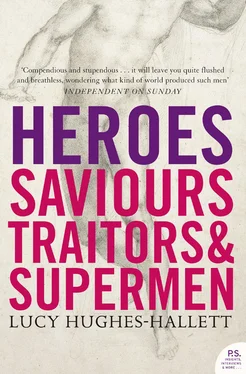Alcibiades was not only exceptional: he was also bellicose. The Athenians were a fighting people, but they were also justly proud of their great creation, a civilization based on the resolution of differences by non-violent dispute. The heroes of old were still worshipped in classical Athens. Hero cults were numerous, and attracted distinguished devotees (Alcibiades’ contemporary Sophocles was a priest in the cult of the hero Halon). But the heroes were fierce spirits who had to be propitiated. They were thirsty for blood, which was poured, after dark, into trenches at the supposed site of their burials; and if they were not appeased, their anger was terrible.
‘ Let me seizegreat glory,’ Homer’s Achilles begs his mother, ‘and drive some woman of Troy … /To claw with both hands at her tender cheeks and wipe away/Her burning tears as the sobs come choking from her throat.’ Homer’s warriors know full well that their splendid exploits are the cause of others’ grief: they may regret the fact, but they do not jib at it. To later generations, though, their ruthlessness came to seem savage and abhorrent. In the Iliad Achilles sacrifices twelve Trojan prisoners on Patroclus’ pyre, slaughtering them in cold blood and hacking their bodies to pieces. Homer reports his action briefly and without condemnation; but to Euripides, who had celebrated Alcibiades’ Olympic victory with a song, Achilles’ human sacrifices were monstrous. In his Hekabe Achilles’ ghost demands the slaughter of the Trojan Princess Polyxena on his grave. In Iphigenia at Aulis Achilles is associated with Agamemnon’s sacrifice of his daughter. If she were not killed there would be no wind to carry the black ships to Troy, no war in which Achilles can demonstrate his valour. The death of the innocent girl is the necessary prerequisite for the fulfilment of the warrior’s glorious destiny: both the hero and his glory are tainted with her blood. In both plays, Achilles is the arrogant, pathologically violent representative of a code of conduct that is essentially destructive and inimical to the institutions of the family and of the civil state. There is a story, of which the earliest surviving version was written down by Flavius Philostratus in the second century ad but whose origin is probably much earlier, that Achilles’ ghost appeared to a merchant and demanded a slave girl who boasted of being descended from King Priam. The merchant, terrified, handed her over. The spectral hero fell upon her and tore her to pieces. In the light cast backwards across time by these horrific stories Homer’s account of Achilles’ rage over the loss of Briseis takes on a different shading. So do his feats on the Iliad ’s field of battle. The brilliant warrior is also the slaughterer of fathers, husbands, farmers, councillors; the enemy of all women; the destroyer of civilized society.
The shattered Hermae were not the only ominous sight in the streets of Athens at the time the Sicilian expedition sailed out with Alcibiades as one of its commanders. It was the feast of Adonis, and groups of women dressed as though in deep mourning were carrying effigies of the dead youth, the beautiful young man whom Venus had loved, through the streets, wailing as they went. The sombre processions were not much remarked upon at the time; but later, when the terrible outcome of the expedition was known, they were remembered with a kind of horrified awe as presages of what was to come and, more particularly, as reminders of the price to others of one man’s glory. If the campaign was to fulfil what Socrates had identified as being Alcibiades’ ambition, ‘ to fill the mouthsof all men with your name and power’, it would do so only at the cost of many other young men’s lives. It was a price the Athenians did not pay gladly. In one of the reversals frequent in the history of Athenian democracy the people first allowed themselves to be seduced by Alcibiades’ high talk of glorious conquest, and then, in a fit of self-disgust and revulsion, punished him for their own lapse into irrationality.
Alcibiades was not placed under arrest when the Salaminia arrived in Sicily. His opponents still feared provoking a mutiny and, as Plutarch remarked, Alcibiades ‘ might very easilyhave brought this about if he had wished’. But he preferred the role of exile to that of rebel. Apparently docile, he agreed to follow the Salaminia home in his own ship. In southern Italy he put ashore, and vanished. The Athenian Assembly tried him in his absence and condemned him to death. His estate was confiscated. His name was inscribed on a stele set up on the Acropolis as a monument to his disgrace. All the priests and priestesses of Athens were ordered to call down curses on him. A reward of a talent (a considerable fortune) was offered to anyone who could bring him in, dead or alive. Three months after he had sailed from Athens with such pomp and splendour he was an outcast, a hunted man with a price on his head.
What Alcibiades did next has identified him, in the opinion of many latter-day historians, as an unprincipled scoundrel. When he heard of the death sentence pronounced against him he is reported to have said grimly: ‘ I will show themI am still alive.’ Achilles turned traitor after his quarrel with Agamemnon, praying that his fellow Greeks should be beaten back to their ships. So, now, did Alcibiades. Before he even left Sicily, he had begun on his treachery. The Athenians had contacted an opposition group in the Sicilian city of Messina and arranged that they should open the gates to an Athenian attack. Alcibiades informed the pro-Spartan authorities in Messina of the plot. The attack was thwarted and the conspirators were put to death. From Italy Alcibiades crossed to the Peloponnese, and after first sending to ask for a guarantee of his safety, he made his way to Sparta. There he offered his services to his hosts, his native city’s archenemies. He urged them to intervene in Sicily (which they did, with devastating consequences for the Athenians). He also suggested that they do what the Athenians had for years been dreading that they might do – fortify the stronghold of Dekelea in the mountains north of Athens which commanded the route whereby the revenue from the silver mines, the tribute money from the offshore colonies, and, most importantly, food supplies, reached Athens. The Spartans acted on his advice. ‘ It was this, more than any other single action,’ remarks Plutarch, ‘which wore down the resources of Athens, and finally ruined her.’
Such a betrayal, surely, could never be forgiven. Yet this was the same Alcibiades whom the Athenians were to welcome back seven years later with garlands and embraces and cries of joy, whom they crowned with a golden crown and elected general with supreme powers on both land and sea, the same Alcibiades of whom it was said that while he lived Athens could not die.
We live in a post-nationalist age, one in which Alcibiades’ disloyalty to his native city seems an absolute disqualification from the pantheon of heroism. But treason has not always been judged the action of the mean-spirited. Achilles despised the kind of status attainable by allegiance to a community of petty mortals and looked to Zeus for confirmation of his honour. Isolated in his tent, he stood by, implacably inactive, while the Trojans slew his compatriots. So, after the Athenians condemned him to death, Alcibiades, as far as his motives can be guessed at, acted for the rest of his life for himself alone, serving now Athens’ enemies, now Athens herself again, true only to himself and his limitless ambition. His Athenian contemporaries intermittently feared and distrusted him. Some hated him. But, traitor though he was, they did not despise him.
The relationship between the individual and the community in fifth-century Athens was an unstable one. The democratic assembly was terrifyingly fickle, inclined to turn savagely on its own servants. The generals who later replaced Alcibiades (after he was stripped of his command for the second time in 406 BC) were all put to death for alleged misconduct during a battle they had won for Athens. And just as the state could and did abandon its citizens, so citizens could quit the state. Both of the two great Athenian historians who wrote as contemporaries of Alcibiades, Thucydides and Xenophon, were to spend the majority of their adult lives away from the city, the former exiled for a military failure, the latter leaving of his own free will to serve first the Persian pretender Cyrus and subsequently the Spartans. Alcibiades’ defection would not have outraged his contemporaries to anything like the extent that it has shocked posterity.
Читать дальше












